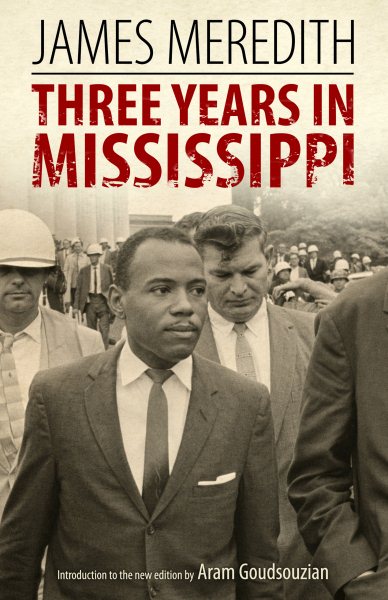By Gregg Mayer. Special to the Clarion Ledger Sunday print edition (March 17)
Few individuals in Mississippi’s modern history are as emboldened, important and inscrutable as James Meredith.
 Famous for integrating the University of Mississippi in 1962, Meredith has been a challenging and criticizing voice in the Civil Rights Movement in Mississippi ever since. In some ways, Meredith started it all in his home state, and he documented that struggle in his first book Three Years in Mississippi (UPM, $30), a 336-page memoir that this year received a much-needed reprint by the University Press of Mississippi.
Famous for integrating the University of Mississippi in 1962, Meredith has been a challenging and criticizing voice in the Civil Rights Movement in Mississippi ever since. In some ways, Meredith started it all in his home state, and he documented that struggle in his first book Three Years in Mississippi (UPM, $30), a 336-page memoir that this year received a much-needed reprint by the University Press of Mississippi.
Originally published in 1966, Three Years in Mississippi takes readers back into Meredith’s own raw words shortly after he had returned to his home state in 1960 having spent ten years away.
“To understand the events that occurred during my three years in Mississippi, one must always remember that I returned to my home state to fight a war,” he writes. Throughout his first-person account, Meredith refers to himself as if a soldier in battle.
Meredith chronicles the events in diary-like fashion, using bold headings–such as Provoking the Attention of the Police, The All-Night Session, The Question of My Security–about what he saw, who was with him, and the attitudes and culture he was trying to change.
The centerpiece is Meredith’s denial of admission and eventual lawsuit against Ole Miss, a suit that was nearly ten years after the U.S. Supreme Court decision in Brown v. Board of Education, which had ended public school segregation.
In leading up to the legal challenge, Meredith includes the complete texts of letters he wrote to Civil Rights leaders of the time, including to Thurgood Marshall, who would later sit on the U.S. Supreme Court:
“I have always been a ‘conscientious objector’ to my ‘oppressed status’ as long as I can remember,” Meredith wrote Marshall. “I am familiar with the probable difficulties involved in such a move as I am undertaking and I am fully prepared to pursue it all the way to a degree from the University of Mississippi.”
With the support of the NAACP, Meredith filed suit in federal court after his admission was denied. Long excerpts of court testimony are included in the book. The trial judge incredulously found that “[t]he evidence overwhelmingly showed that the Plaintiff was not denied admissions because of his race,” adding that race was not even considered by the University. Such hollow pronouncements were eventually reversed by the Fifth Circuit Court of Appeals, and Meredith was admitted to school.
On September 29, 1962, Meredith traveled to Oxford, but he writes he turned around amid reports of rioting. It wasn’t until two days later, with the smell of tear gas still in the air, that Meredith was on campus and learned the full extent of the rioting, including that two men were killed and several injured.
“Some newspapermen later asked me if I thought attending the university was worth all this death and destruction,” Meredith writes. “The question really annoyed me. Of course, I was sorry! I hadn’t wanted this to happen. I believe it could have been prevented by responsible political leadership in Mississippi.”
Enduring harassment as a daily routine, Meredith earned his political science degree from Ole Miss on August 18, 1963. Since that transformative time, Meredith has made his way down many unexpected paths, and over the years, “squandered his reputation through odd political choices, business failings, and quirky behavior,” writes University of Memphis Professor Aram Goudsouzian in a brilliantly illuminating introduction to the book that puts this touchstone event in Civil Rights history into contextual focus.
But despite whatever Meredith chose to do after his time in Oxford, the import of Three Years in Mississippi is how it powerfully records the fervent narrative of a young man who lived within a system that considered him inferior, and he pushed back against it.
Gregg Mayer is a lawyer and writer who serves as Chief Operating Officer at Mississippi Public Broadcasting. He graduated from the University of Mississippi School of Law, where he was Editor-in-Chief of the Mississippi Law Journal.
James Meredith will be at Lemuria on Saturday, April 13, in conversation with Cara Meredith and Jamar Tisby, at 2:00 p.m.


Comments are closed.